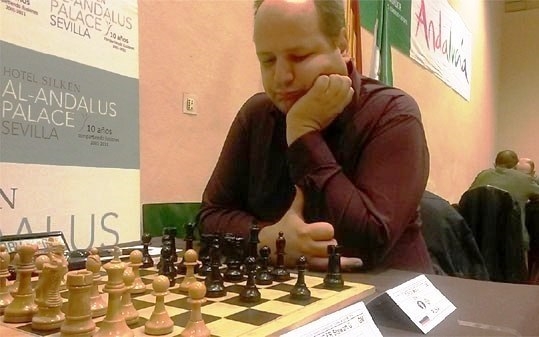Maak kennis met... Maxim Turov
Maxim Turov (1979) is a Russian Grandmaster and, according to his answers, one of the more relaxed ones. Of course he takes chess seriously, as his rating suggests (2618), but at the same time the pleasure of the game seems at least as important to him. Among many other tournaments, he won the Dutch Open in Dieren in 2005 and 2011. Turov now primarily works as a coach. Since 2016 he and his family have been based in St. Petersburg and before that in Tromso, Norway. His students vary from the age of 8 till 88 and from beginners till national team members.
How would you describe your playing style?
In my opinion, the term ‘playing style’ has gone... Nowadays if one is not flexible and universal, one is not a chess player.
How do you cope with stress behind the board?
I think life could be way more stressful than any game of chess. Yes, it's a very nice and deep game, but we all are moving wooden pieces... Not a big deal if something went wrong.
What is your favourite opening?
No, sorry, I have no feelings towards openings. I love chess with all its diversity.
What kind of influence did your place and country of birth have on the chess player you become?
It’s mixed. I was born in a small town 120 km from the nearest chess school, so it was not easy to reach some descent level. On the other hand, Russia is a country with great chess traditions, as everyone knows. There is a chess set in almost every family... Such an intense competition produces good results.
Could you picture yourself being with someone who doesn’t play chess?
My wife, former champion of Russia, stopped playing professional chess quite long ago. We very rarely talk about chess at home... So, my answer is 'Yes, no problem at all.'
What would your profession be if you weren’t a chess player/coach?
I have a bachelor's degree in economics, but I’m still very happy with doing chess in all forms. It is difficult to imagine myself not doing anything chess-related.
How do you prepare for your opponents?
It very much depends on the current situation. What I teach my student to do is not always the same as what I do myself. Sometimes, now that I’m getting older, I feel it's more important to keep a fresh mind and rest, take 15 to 30 minutes to prep, and do my best during the game. .
Is the pleasure winning some games worth the frustration of losing others? In other words: what has more impact on future results for you, winning or losing a game?
Of course there is a lot to learn from our mistakes, but it's a kind of consolation... To lose a game is definitely not the best way to learn how to win a game.
How do you think the game of chess will be in fifty years?
It will be fine. If human civilization will be fine... Maybe, I should not have been watching TV news so much today?
What is the strangest or nicest dream you have ever had about chess?
It is the most strange one, and pretty nice one, both in one. What if all my students, in which I put a piece of my soul, would call me tomorrow and say something like: ‘Thank you, Maxim, and a happy birthday.’
- Benno de Jongh -












